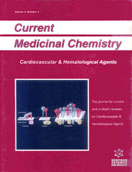Abstract
Recent large clinical trials have shown that angiotensin II type I receptor blockers (ARBs) reduce cardiovascular morbidity and mortality in patients with heart failure, acute myocardial infarction, and hypertension. However, the mechanism underlying antiatherogenic effects of ARBs remains unclear. The vascular endothelium is involved in the release of various vasodilators, including nitric oxide (NO), prostacyclin, and endothelium-derived hyperpolarizing factor as well as vasoconstrictors. NO plays an important role in the regulation of vascular tone, the inhibition of platelet aggregation, and the suppression of smooth muscle cell proliferation. Several investigators have reported impairment in endothelium-dependent vasodilation in the forearm, coronary, and renal vasculature in cardiovascular diseases, including hypertensive patients. Cardiovascular diseases are associated with alteration in endothelial function. Endothelial dysfunction is the initial step in the pathogenesis of atherosclerosis. Anti-renin-angiotensin system agents, angiotensin-converting enzyme (ACE) inhibitors improve endothelial function in patients with hypertension, diabetes mellitus, and coronary artery disease. It is well known that ACE inhibitors augment endothelium-dependent vasodilation through an increase in NO bioavailability, by an increase in NO production and a decrease in NO inactivation. ARBs are also thought to prevent cardiovascular complications through an augmentation of endothelial function. In this review, we focus on recent findings and putative mechanisms of the beneficial effects of ARBs on endothelial function.
Keywords: angiotensin II, angiotensin II type I receptor blocker, coronary artery disease, diabetes mellitus, endothelial function, hypercholesterolemia, hypertension, nitric oxide, oxidative stress, reactive oxygen species
 2
2













